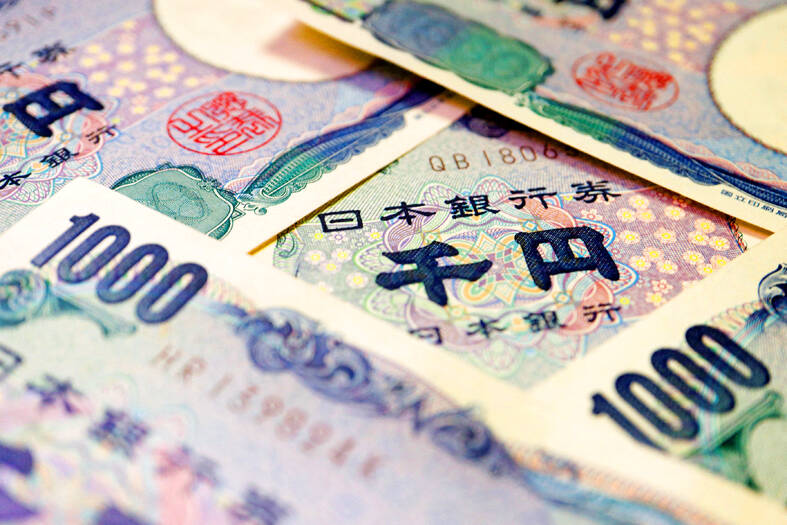Japan intends to closely monitor the impact on its currency of US President Donald Trump’s new tariffs and is worried about the international fallout from the trade imposts, Japanese Minister of Finance Katsunobu Kato said.
“We need to carefully see how the exchange rate and other factors will be affected and what form US monetary policy will take in the future,” Kato said yesterday in an interview with Fuji Television.
Japan is very concerned about how the tariffs might impact the global economy, he added.

Photo: REUTERS
Kato spoke as nations and firms brace for potential repercussions after Trump unleashed the first salvo of his tariff war, with general levies of 25 percent on Canada and Mexico, and 10 percent on China. Trump signed the orders for the tariffs, which are to take effect tomorrow, although it is unclear whether the period in between provides a last-chance window for a deal.
Japanese Prime Minister Shigeru Ishiba is reportedly set to meet Trump on Friday in the US. Tokyo is trying to strengthen ties with the new US administration and Kato recently held a virtual meeting with US Secretary of the Treasury Scott Bessent.
Asked if he had any indications from his US counterpart on whether Trump intends to weaken the US dollar and strengthen the yen, given the president sees the strong greenback as problematic, Kato said the two did not discuss the matter specifically.
“We confirmed that we will closely discuss foreign exchange as we look at the financial and economic conditions as a whole,” he said. “I got the impression that he is a very calm person.”
The yen’s weakness has pushed up the prices of imported food, energy and materials, which has stoked inflation. Persistent price pressures have prompted the Bank of Japan to raise interest rates gradually, while voter discontent over a cost-of-living crunch played a role in delivering a major setback for the nation’s ruling coalition in last year’s election.
Japan intervened in the foreign exchange market multiple times last year to prop up the yen.
“When import prices rise, we will see cost-push inflation,” Kato said. “On the other hand, prices also increase when domestic demand expands. So, there are several phases and I think it is important to carefully assess each situation and take the necessary measures.”

Hon Hai Precision Industry Co (鴻海精密) yesterday said that its research institute has launched its first advanced artificial intelligence (AI) large language model (LLM) using traditional Chinese, with technology assistance from Nvidia Corp. Hon Hai, also known as Foxconn Technology Group (富士康科技集團), said the LLM, FoxBrain, is expected to improve its data analysis capabilities for smart manufacturing, and electric vehicle and smart city development. An LLM is a type of AI trained on vast amounts of text data and uses deep learning techniques, particularly neural networks, to process and generate language. They are essential for building and improving AI-powered servers. Nvidia provided assistance

GREAT SUCCESS: Republican Senator Todd Young expressed surprise at Trump’s comments and said he expects the administration to keep the program running US lawmakers who helped secure billions of dollars in subsidies for domestic semiconductor manufacturing rejected US President Donald Trump’s call to revoke the 2022 CHIPS and Science Act, signaling that any repeal effort in the US Congress would fall short. US Senate Minority Leader Chuck Schumer, who negotiated the law, on Wednesday said that Trump’s demand would fail, while a top Republican proponent, US Senator Todd Young, expressed surprise at the president’s comments and said he expects the administration to keep the program running. The CHIPS Act is “essential for America leading the world in tech, leading the world in AI [artificial

DOMESTIC SUPPLY: The probe comes as Donald Trump has called for the repeal of the US$52.7 billion CHIPS and Science Act, which the US Congress passed in 2022 The Office of the US Trade Representative is to hold a hearing tomorrow into older Chinese-made “legacy” semiconductors that could heap more US tariffs on chips from China that power everyday goods from cars to washing machines to telecoms equipment. The probe, which began during former US president Joe Biden’s tenure in December last year, aims to protect US and other semiconductor producers from China’s massive state-driven buildup of domestic chip supply. A 50 percent US tariff on Chinese semiconductors began on Jan. 1. Legacy chips use older manufacturing processes introduced more than a decade ago and are often far simpler than

Gasoline and diesel prices this week are to decrease NT$0.5 and NT$1 per liter respectively as international crude prices continued to fall last week, CPC Corp, Taiwan (CPC, 台灣中油) and Formosa Petrochemical Corp (台塑石化) said yesterday. Effective today, gasoline prices at CPC and Formosa stations are to decrease to NT$29.2, NT$30.7 and NT$32.7 per liter for 92, 95 and 98-octane unleaded gasoline respectively, while premium diesel is to cost NT$27.9 per liter at CPC stations and NT$27.7 at Formosa pumps, the companies said in separate statements. Global crude oil prices dropped last week after the eight OPEC+ members said they would